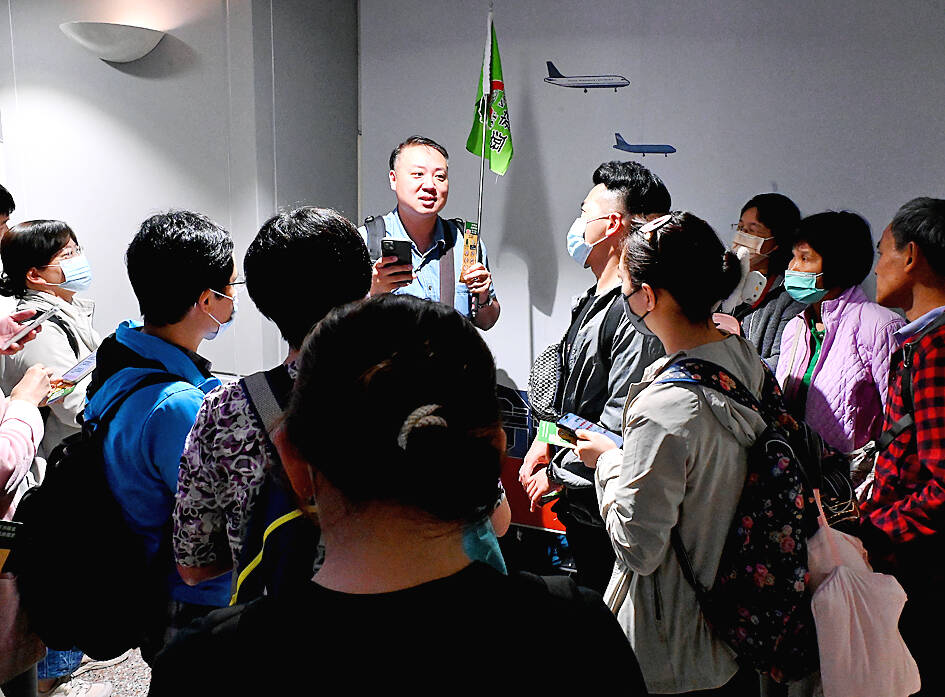Pakistan’s decision to close its airspace due to a conflict with India led to the cancelation or rerouting of 10 flights from EVA Airways and China Airlines yesterday, the Taiwan Taoyuan International Airport Web site showed.
Pakistan closed its airspace after a series of strikes conducted by India early yesterday morning against what New Delhi called “known terror camps” in response to a mass shooting on April 22.
As a result, several flights to and from Taoyuan airport were rerouted or delayed for safety reasons, the airport operator said.

Photo: Chu Pei-hsiung, Taipei Times
Ten flights had been affected, including China Airlines flights that departed on Tuesday headed for Prague, Amsterdam, Rome, London and Frankfurt, Germany, with the planes rerouted to Bangkok.
China Airlines’ Taipei to London flight today was canceled.
China Airlines said it activated contingency plans and had “taken a series of measures to ensure the safety of its passengers and crew,” without elaborating.
EVA Air’s Amsterdam-Bangkok-Taipei, London-Bangkok-Taipei and Taipei-to-Paris flights were rerouted.
Flight BR62 from Vienna to Bangkok returned to Vienna, while Flight BR95 from Taoyuan to Milan was diverted to Vienna to refuel before continuing onto Italy, EVA Air said.
EVA Air would continue to monitor the situation and adjust routes to avoid affected airspace to ensure safety of its crew members and passengers, it said.
Before Russia’s invasion of Ukraine, many Europe-bound flights from Taiwan flew over Russia, but Taiwanese airlines are now banned from doing so after Taipei joined Western sanctions on Moscow. The new routes generally fly over India, Pakistan and Central Asia.
Korean Air said it had begun rerouting its Incheon-Dubai flights, opting for a southern route that passes over Myanmar, Bangladesh and India, instead of the previous path through Pakistani airspace.
Thai Airways said that flights to destinations in Europe and South Asia would be rerouted, warning that there might be some delays.
Vietnam Airlines said that its flights had been affected and it would provide details regarding rerouting schedules.

EVA Airways today confirmed the death of a flight attendant on Saturday upon their return to Taiwan and said an internal investigation has been launched, as criticism mounted over a social media post accusing the airline of failing to offer sufficient employee protections. According to the post, the flight attendant complained of feeling sick on board a flight, but was unable to take sick leave or access medical care. The crew member allegedly did not receive assistance from the chief purser, who failed to heed their requests for medical attention or call an ambulance once the flight landed, the post said. As sick

A drunk woman was sexually assaulted inside a crowded concourse of Taipei Railway Station on Thursday last week before a foreign tourist notified police, leading to calls for better education on bystander intervention and review of security infrastructure. The man, surnamed Chiu (邱), was taken into custody on charges of sexual assault, taking advantage of the woman’s condition and public indecency. Police discovered that Chiu was a fugitive with prior convictions for vehicle theft. He has been taken into custody and is to complete his unserved six-month sentence, police said. On Thursday last week, Chiu was seen wearing a white

The Taichung District Court yesterday confirmed its final ruling that the marriage between teenage heir Lai (賴) and a man surnamed Hsia (夏) was legally invalid, preventing Hsia from inheriting Lai’s NT$500 million (US$16.37 million) estate. The court confirmed that Hsia chose not to appeal the civil judgement after the court handed down its ruling in June, making the decision final. In the June ruling, the court said that Lai, 18, and Hsia, 26, showed “no mutual admiration before the marriage” and that their interactions were “distant and unfamiliar.” The judge concluded that the couple lacked the “true intention of

EVA Airways, one of the leading international carriers in Taiwan, yesterday said that it was investigating reports that a cabin crew manager had ignored the condition of a sick flight attendant, who died on Saturday. The airline made the statement in response to a post circulating on social media that said that the flight attendant on an outbound flight was feeling sick and notified the cabin crew manager. Although the flight attendant grew increasingly ill on the return flight, the manager did not contact Medlink — a system that connects the aircraft to doctors on the ground for treatment advice during medical